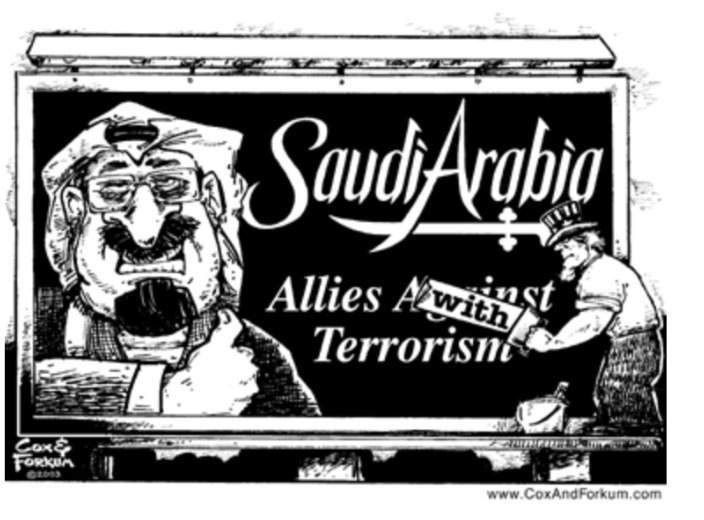
Although the extent to which oil-related funding has sustained ISIS over the past couple of years is highly contested, it’s undeniable that the collapse in prices has had a negative cash flow impact on the terror threat du jour. As such, how’s the group sustaining itself in the fact of such a major cash crunch? According to a UK inquiry, we can thank donations from America’s Persian Gulf “allies.”
Of course, none of this will be surprising to Liberty Blitzkrieg readers. I’ve been pointing this out for a very long time. In fact, evidence was already piling up two years ago, as can be seen in the following excerpts from a piece published in June 2014 titled, America’s Disastrous Foreign Policy – My Thoughts on Iraq:
But in the years they were getting started, a key component of ISIS’s support came from wealthy individuals in the Arab Gulf States of Kuwait, Qatar and Saudi Arabia. Sometimes the support came with the tacit nod of approval from those regimes; often, it took advantage of poor money laundering protections in those states, according to officials, experts, and leaders of the Syrian opposition, which is fighting ISIS as well as the regime.
“Everybody knows the money is going through Kuwait and that it’s coming from the Arab Gulf,” said Andrew Tabler, senior fellow at the Washington Institute for Near East Studies. “Kuwait’s banking system and its money changers have long been a huge problem because they are a major conduit for money to extremist groups in Syria and now Iraq.”
Iraqi Prime Minister Nouri al-Maliki has been publicly accusing Saudi Arabia and Qatar of funding ISIS for months. Several reports have detailed how private Gulf funding to various Syrian rebel groups has splintered the Syrian opposition and paved the way for the rise of groups like ISIS and others.
Fast forward two years, and not much has changed. The Guardian reports:
A collapse in oil revenues available to Islamic State is likely to have made it increasingly dependent on donations from wealthy Gulf states and profits from foreign exchange markets, the first UK inquiry into the terror group’s funding has heard.
Attacks by the US-led coalition on Isis’s oil installations and convoys are believed to have reduced its oil revenues by more than a third as the funding of the group becomes one of the central fronts in the battle to defeat it in Syria and Iraq.
But experts have told the committee the UK government may be vastly over-estimating the importance of oil revenue, and underestimating the extent to which Isis is reliant on foreign donors in the Gulf or its manipulation of the Iraqi banking system.
Luay al-Khatteeb from the Iraq Energy Institute claimed the cost of waging war for Isis must be so high, and its oil revenues now so limited, that it must be accessing large-scale donations.
“Some might wonder to what extent Gulf Arab financing has continued to subsidise the caliphate. Certainly, IS was able to draw on some other sources of income between January 2015, when Raqqa’s economy had reportedly collapsed, and mid-January 2016, when IS forces have been able to launch a major new Syrian offensive. The money is coming from somewhere.”
The UK government has effectively admitted that Gulf states did fund Isis in its early days, saying it is confident all such government funding has now stopped. But Dan Chugg, a Foreign Office expert, admitted to the select committee this reassurance had limited value.
Meanwhile, it’s also become abundantly clear that the Saudis played a major role in the 9/11 attacks. See:
The New York Post Reports – FBI is Covering Up Saudi Links to 9/11 Attack
Two Congressmen Push for Release of 28-Page Document Showing Saudi Involvement in 9/11
With friends like these…
In Liberty,
Michael Krieger
Donate bitcoins: 35DBUbbAQHTqbDaAc5mAaN6BqwA2AxuE7G
Follow me on Twitter.


